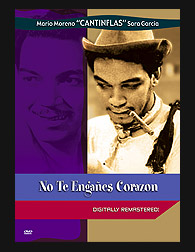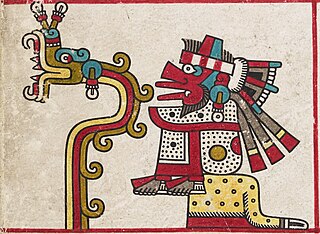
Tezcatlipoca or Tezcatl Ipoca was a central deity in Aztec religion. He is associated with a variety of concepts, including the night sky, hurricanes, obsidian, and conflict. He was considered one of the four sons of Ometecuhtli and Omecihuatl, the primordial dual deity. His main festival was Toxcatl, which, like most religious festivals of Aztec culture, involved human sacrifice.

The practice of human sacrifice in pre-Colombian cultures, in particular Mesoamerican and South American cultures, is well documented both in the archaeological records and in written sources. The exact ideologies behind child sacrifice in different pre-Colombian cultures are unknown but it is often thought to have been performed to placate certain gods.

Don't Fool Yourself Dear is a 1937 Mexican comedy-drama film directed by Miguel Contreras Torres and starring Carlos Orellana. It is the first full-feature film of Mexican comedian Cantinflas after he became a star of the carpa circuit. It was also one of the earliest films of Orellana and Sara García and the first where they share the screen.

The Aztec religion is a polytheistic and monistic pantheism in which the Nahua concept of teotl was construed as the supreme god Ometeotl, as well as a diverse pantheon of lesser gods and manifestations of nature. The popular religion tended to embrace the mythological and polytheistic aspects, and the Aztec Empire's state religion sponsored both the monism of the upper classes and the popular heterodoxies.

Human sacrifice was common in many parts of Mesoamerica, so the rite was nothing new to the Aztecs when they arrived at the Valley of Mexico, nor was it something unique to pre-Columbian Mexico. Other Mesoamerican cultures, such as the Purépechas and Toltecs, and the Maya performed sacrifices as well and from archaeological evidence, it probably existed since the time of the Olmecs, and perhaps even throughout the early farming cultures of the region. However, the extent of human sacrifice is unknown among several Mesoamerican civilizations. What distinguished Aztec practice from Maya human sacrifice was the way in which it was embedded in everyday life. These cultures also notably sacrificed elements of their own population to the gods.

Su Excelencia is a 1967 Mexican political satire film directed by Miguel M. Delgado and starring Cantinflas and Sonia Infante. The film is set in a parody universe where "Red" and "Green" countries are the political equivalents of the socialist and capitalist countries of the Cold War, which the film satirizes. Cantinflas portrays Lupitos, a chancellor stationed in his country's embassy in the communist country of Pepeslavia who later ascends to the role of ambassador and has to decide the pivotal vote of joining the "Reds" or the "Greens", therefore deciding the fate of the entire world.

Miguel Zacarías Nogaim was a Mexican film director, producer, and writer.
El bolero de Raquel is a 1957 Mexican comedy film directed by Miguel M. Delgado and starring Cantinflas, Manola Saavedra, Flor Silvestre, and child actor Paquito Fernández. The film's art direction was by Gunther Gerszo.

Quetzalcoatl is a deity in Aztec culture and literature. Among the Aztecs, he was related to wind, Venus, Sun, merchants, arts, crafts, knowledge, and learning. He was also the patron god of the Aztec priesthood. He was one of several important gods in the Aztec pantheon, along with the gods Tlaloc, Tezcatlipoca and Huitzilopochtli. The two other gods represented by the planet Venus are Tlaloc and Xolotl.
The Hidden One is a 1956 Mexican drama film directed by Roberto Gavaldón. It was entered into the 1956 Cannes Film Festival.
The Eternal Secret is a 1942 Mexican drama film directed by Carlos Orellana and starring Orellana, Marina Tamayo and David Silva. The film's sets were designed by the art director Ramón Rodríguez Granada.
Josep María Castellví Marimón was a Catalan film director. He made one of the first sound shorts, Cinópolis in France in 1931.
El Siete Machos is a 1951 Mexican comedy western film directed by Miguel M. Delgado, and starring Cantinflas, Alma Rosa Aguirre, and Miguel Ángel Ferriz.

The House of the Fox is a 1945 Mexican musical comedy film directed and produced by Juan José Ortega. It stars Virginia Fábregas, Isabela Corona, and Alberto Galán.

Nobody Will Know is a 1953 Spanish comedy film directed by Ramón Torrado and starring Fernando Fernán Gómez, Julia Martínez and Julia Caba Alba. Complications ensue when a modest bank clerk becomes caught up in an armed robbery. The film's sets were designed by the art director Sigfrido Burmann.

Drop the Curtain is a 1955 Mexican comedy film directed by Miguel M. Delgado and starring Cantinflas, Christiane Martel and Beatriz Saavedra. The film's art direction was by Gunther Gerszo.
The Extra is a 1962 Mexican comedy film directed by Miguel M. Delgado and starring Cantinflas and Alma Delia Fuentes. In the film, Cantinflas plays a man who works as an extra through several films. This was the last Cantinflas film whose art direction was made by long-time set designer Gunther Gerzso.
Un Quijote sin mancha is a 1969 Mexican comedy film directed by Miguel M. Delgado and starring Cantinflas, Ángel Garasa, Lupita Ferrer and Susana Salvat. The title is a pun on the title of the novel Don Quixote of La Mancha.
Carnival in the Tropics, also known in Spanish as Fiesta en Veracruz is a 1942 Mexican comedy film written and directed by Carlos Villatoro. Although the film was released in other countries in 1942, it wasn't released in Mexico until 1946 due to copyright disputes.

Such Is My Country is a 1937 Mexican comedy film directed by Arcady Boytler and starring Antonio R. Frausto, Mercedes Soler, Juan José Martínez Casado, Manuel Medel, and Mario Moreno, better known by the stage name Cantinflas. It was the first film to feature Cantinflas in a prominent role and the first of Cantinflas's films together with Medel as a team.










